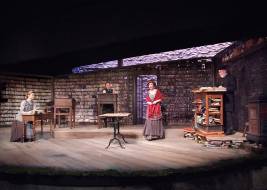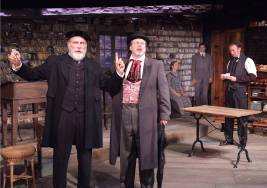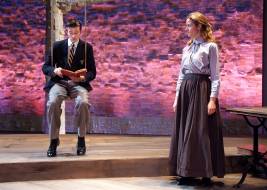
In 1879, British lexicographer James Murray was hired by Oxford University Press to edit a new dictionary of the English language, a task expected to take about ten years and result in a 7,000-page tome. Holed up in a corrugated-iron garden shed on the grounds of Mill Hill School, Murray began the monumental undertaking with the help of a small team of assistants. Neither the linguist nor the dons of Oxford could have imagined that it would take until 1928 for the dictionary to be completed (nearly a decade after Murray’s death) and that the final product would end up a twelve-volume tome instead of the initially planned four volumes.
If the above bit of British linguistic trivia seems hardly the stuff of great drama, it would seem even less likely the source of laugh-out-loud comedy. Nonetheless, it’s precisely the latter that English playwright Moby Pomerance has concocted in his terrifically entertaining The Good Book Of Pedantry And Wonder, a World Premiere production at Theatre @ Boston Court in collaboration with Circle X Theatre Co.
Bruno Louchouarn’s mysterious, quirky mood music and Brian Sidney Bembridge’s spectacularly detailed set with its shelves upon shelves packed with a gazillion or so slips of paper clue us in from lights up that we are in for something out of the ordinary, and something out of the ordinary is precisely what we get.
The Good Book opens with one of Murray’s assistants, a certain Mr. Williams (Henry Todd Ostendorf), informing head clerk Smythic (Time Winters) that his few months at the job are already more than enough and that he is quitting, news that doesn’t sit well with the beleaguered Smythic, who remarks that it’s now he who will have to fetch the coal.
More significant among the day’s events is the return to the homestead of Murray’s 30ish son Paul (Ryan Welsh), away these past eight years traversing the globe “making maps and such.” Paul’s sister Jane (Melanie Lora), who has stuck around all these years helping her father, informs Paul that if she and her father don’t come up with considerably more money to fund the financially beleaguered project, they’ll soon be out on their ears.
We soon meet James Murray himself (John Getz), described by his daughter as “older than Moses and twice as cantankerous,” and before long, another visitor has arrived to interrupt Murray’s day of labor. He is Wynchell (Travis Michael Holder), sent by Oxford University Press to report back on the Murray team’s progress, or lack of such. “Twenty years of effort,” exclaims Wynchell in disbelief, “and all the best you can show is a shed at the end of a garden?”
Meanwhile, Jane has made it clear to Paul that she wishes him to come home for good and work with her and their father “in any role you want,” but Paul has other plans. Despite the many terrifying experiences he’s had traveling the globe, the only place that truly terrifies him is his father’s garden shed. No, indeed. Paul is here for a few days, no more.
With a father like James Murray, it’s no wonder Paul has stayed away so long. Murray père simply can understand why Murray fils has wasted his time making maps of the world “when I offered him the guts of it.”
The arrival of someone from Paul’s past, a former classmate named Owen (Henry Todd Ostendorf), may be precisely what the Murrays need to keep Paul around, especially knowing what most of us know about English lads and boarding schools, suspicions confirmed when it turns out that Jane had years ago observed Paul kissing a Spaniard of the male persuasion.
Will father and daughter be able to convince son to stick around? Will Jane continue sacrificing her freedom and happiness for the sake of her family? Will Murray find the funds to continue his Sisyphean task? Will anyone ever pay attention to the virtually invisible Smythic?
These and other questions may (or may not) be answered in the course of The Good Book Of Pedantry And Wonder’s drolly comedic two acts—but no matter. With a playwright as clever and original as Pomerance providing the words, direction as sparkling as that of John Langs, and a cast as splendid as the one assembled on the stage of Theatre @ Boston Court, the journey from lights up to curtain calls is an enjoyable one indeed.
Nowhere is Pomerance’s intelligence more on display than in the character of Jane, an expert on the hair-splitting minutiae of language, ever ready with a subtly sarcastic (and inevitably witty) criticism of a badly turned phrase, English or not. Upon hearing Smythic’s earnest efforts to speak the language of Socrates, Jane remarks, “There are drunks in Macedonia who wouldn’t call that Greek.”
If I fell a bit in love with Jane, it’s as much from Lora’s delectably tart performance as from the delectably caustic lines Pomerance has given her to say. The busy stage actress proves herself as adept here at period English comedy as she has been in such contemporary dramatic fare as Donald Margulies’ Collected Stories and Dinner With Friends, and she, like her castmates, is a master of comedic timing.
Lora is surrounded by the kind of all-around superb ensemble that Theatre @ Boston Court and Circle X Theatre Co. have become known for, from Getz’s gruff madman of a scholar (with more than a bit of Lear in him) to Winters’ droll turn as a man grown tired of (and used to) not getting any respect—or any notice at all for that matter. Gillian Doyle does her accustomed splendid work as a boarding house owner with far slighter goals than the Murrays’ (she just wants to get paid) as does Holder, in a sweet turn as a man on an impossible mission who is only too glad to be sent off to Ireland in search of the letter “o.” Recent UC Irvine MFA grad Welsh makes an impressive Boston Court debut as a young man for whom home holds more terror than any of countries he’s spent the last eight years mapping. Ostendorf completes the cast in fine fashion in his pair of roles, though it was not until I checked my program that I knew for sure that Owen and Mr. Williams were not one in the same. (Perhaps more could be done to physically differentiate the two.)
Bembridge’s set is, as previously stated, a wonder of imagination and detail. (Even the sky behind the shed is made of slips of white paper, gorgeously illuminated by Bembridge’s own superb lighting design.) Dianne K. Graebner’s costumes, composer Louchouarn’s sound design, and especially Chuck Olson’s properties design are equally praiseworthy. Dialect coach Tracy Winters gets thumbs up for the cast’s effortless (and spot on) accents. Augustus Heagerty is assistant director and Katherine Haan is production stage manager.
As was true with Boston Court’s recent The Twentieth Century Way, The Good Book Of Pedantry and Wonder requires careful viewing, with particular attention to be paid to its multi-layered use of language, entirely appropriate for a play about language. But the effort pays off. This is one of the smartest plays I’ve seen in a long while, and every bit as entertaining as it is smart.
Theatre @ Boston Court, 70 N. Mentor Ave., Pasadena.
–Steven Stanley
August 1, 2010
Photos: Ed Krieger





 Since 2007, Steven Stanley's StageSceneLA.com has spotlighted the best in Southern California theater via reviews, interviews, and its annual StageSceneLA Scenies.
Since 2007, Steven Stanley's StageSceneLA.com has spotlighted the best in Southern California theater via reviews, interviews, and its annual StageSceneLA Scenies.







 COPYRIGHT 2024 STEVEN STANLEY :: DESIGN BY
COPYRIGHT 2024 STEVEN STANLEY :: DESIGN BY